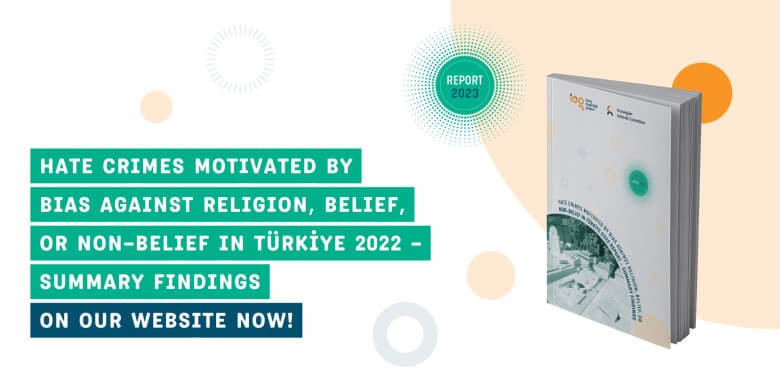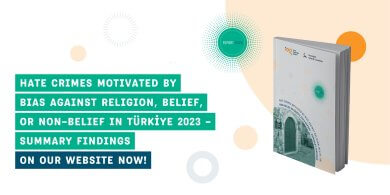New publication: Hate Crimes Motivated by Bias against Religion, Belief, or Non-Belief in Türkiye 2022

The “Hate Crimes Motivated by Bias against Religion, Belief, or Non-Belief in Türkiye 2022 Report” reveals that 36 hate crimes or incidents were identified in 2022.
TO ACCESS THE REPORT PLEASE CLICK HERE
This summary report aims to contribute to the prevention of hate crimes and impunity for perpetrators of hate crimes. It compiles data gathered from submissions from religion or belief communities and media monitoring.
Hate crimes constitute a serious obstacle to social peace
Hate crime motivated by bias against a religion, belief, or non-belief, like all other hate crime, continues to be a critical issue in Türkiye. However, legislation and practice in Türkiye are far from adequate against these crimes. As such, hate crimes remain a serious obstacle to social peace.
The data presented in the report remind us once again that the fight against hate crime in Türkiye needs to be developed in a holistic manner. To this end, the critical needs include:
- monitoring and reporting of hate crimes motivated by bias against religion, belief, or non-belief,
- the effective investigation of these crimes,
- compensation for harm
- a holistic approach to victim support,
- multistakeholder activities.
Information on 36 hate crimes or incidents related to religion, belief or non-belief were documented between January and December 2022.
The hate crime/incident data obtained for 2022 contained the following targeted groups and numbers of incidences:
- Alevis 15,
- Christians 15,
- Jews 4,
- Yazidis 1,
- Muslims 1.
Since there are significant obstacles to reporting hate crimes, it should be noted that this data do not reflect the true extent of these crimes. These incidents, which took place in many parts of Türkiye, include, respectively, threats or threatening behavior, damage to property, damage to places of worship or cemeteries, insults, violent attacks against persons and harassment.
The main barriers to the reporting of hate crimes/incidents are as follows:
- victims are so accustomed to hate incidents that they have a high threshold for reporting such acts;
- individuals prefer not to report due to fear of exclusion or ostracization;
- victims have concerns that their allegations will not be taken seriously or will lead to greater victimisation, including from police officers.
Effective legal processes are not implemented
According to the available data, most of the hate crimes that took place in 2022, all meriting special scrutiny, were not subjected to an effective legal process that included probing the hate crime dimension. As a result, steps have not been taken to combat impunity.
When evaluated together with the monitoring data of previous years, attacks against venues affiliated with religious or belief communities such as schools, cemeteries, places of worship, or houses are among the most common incidents. The marking of places and structures associated with Alevis and Alevism has for a long time now been one of the most commonly observed incidents. Furthermore, the data shows that some places associated with religious or belief communities are repeatedly targeted. Similarly, a detailed analysis of the incidents shows that some people have been subjected to systematic threats or pressure. The continuity of the incidents indicates that there is no effective practice against these crimes.
Progress plan not implemented
The Ministry of Justice’ Human Rights Action Plan dated April 2021 has set important targets. However, these have not been met and hate crime legislation in Türkiye is still far from adequate. Therefore, the authorities must act immediately to develop comprehensive legislation and combat impunity.
The report also includes recommendations for public authorities, civil society, and religious or belief communities. Some of the highlights of these recommendations are presented below:
- Public officials must adopt new legislation, ensure the disaggregated registration of hate crimes, conduct effective investigations and prosecution, and enforce appropriate sanctions to prevent and combat hate crimes. Furthermore, multidimensional measures must be taken to respond to the needs of the victims.
- Civil society should strengthen cooperation with the media to disseminate accurate information about hate crimes and raise awareness on them; work closely with other groups to develop policies, advocacy strategies, and tools for change in the fight against hate crime; carry out activities to raise public awareness; provide direct support to victims and monitor and report hate crimes.
- Religious or belief communities should carry out awareness raising activities on hate crime within religious or belief communities; report hate crime, create their own registry database, and share data which may increase the visibility of hate crimes; offer practical support and share information with victims; cooperate with organisations that work on hate crimes.






